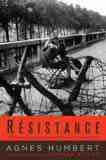Non-Fiction Reviews
Résistance by Agnès Humbert

- Resistance: A Frenchwoman’s Journal of the War
- Bloomsbury USA, 208 pp.
The Courage to Resist
For Agnès Humbert, whole chunks of her time as a Nazi slave worker in Germany passed as if she were in a dream. The reality, the fact that the world had turned into a living nightmare for her and millions of others, is what she realized was necessary to tell.
Résistance, first published in 1946, is marketed as a journal of the famous French Résistance, but it is neither entirely journal nor entirely focused on the movement. After only a brief period of time working for the underground, Humbert was caught and sentenced to hard labor. Her trial, survival and recollections take up the lion’s share of her narrative. And these memories need no publishing doublespeak to be honored.
She is, to start with, an unusual heroine for those used to the Hollywood stereotype. A forty-something art historian, divorced, with two grown children, Humbert could have kept her head down and sat out the war with the majority of her compatriots.
But Humbert had a romantic streak running through her veins. Her father had been a French officer, and she inherited a pride in her country that would rival any zealot. For her “France” is not an abstract concept, it is a living and organic creature that must be nurtured to survive.
When the Germans invade Paris, she first flees the city. Yet after hearing De Gaulle on the radio, the one lone voice urging her to fight, she turns around and throws herself into the cause.
The first section of her journal chronicles this journey as it happens, and we gain both a sense of Humbert’s sharp powers of observation and her childish impetuousness. In one moment she tells us of a baby threatening to fall out of a doll pram too small for it, and in the next she is joking about a museum guard who has taken to pedaling up behind German trucks on his bicycle and sticking Nous sommes pour le général de Gaulle signs on the rear doors.
The waters might be infested with sharks, but in goes Humbert, splashing around with enthusiasm. Beginning is relatively easy, she has friends from her past involvement with communism (she taught at the worker’s university), and her friends have more friends they trust.
Coalescing like mercury into small groups, these amateurish movements start churning out pamphlets and counterpropaganda. Information is their key weapon – Humbert’s group meets as regularly as possible and starts a newspaper in November 1940, which they call Résistance.
Even if it is only words, Humbert knows how powerful their activities can be. In the first months under Occupation, she explains how she struggles with the consequences of her actions, even for a rightful cause. She knows her work will eventually cause deaths, but after seeing a German soldier maltreating a French porter, she decides it is the only way:
Kill like wild beasts, kill to survive. Kill by stealth, kill by treachery, kill with premeditation, kill the innocent.
This is in the abstract. On a personal level, however, Humbert remains almost unbelievably naïve. She keeps a journal, for one, with names and places specified. And as a distributor of Résistance, she stores the records of the 400 names and addresses of subscribers and all copies of the paper under her stair carpet. In her writing, espionage comes across as a giant game.
The early resistors soon discover that the Nazis don’t view their activities with similar lightheartedness. Oblivious to the reason why a German car might be parked outside the hospital her mother is in, Humbert walks straight into hell. A member of the Gestapo has infiltrated and betrayed their group, and she and her friends are rounded up for a show trial. It is only April 1941.
What follows is an account that tests our 21st century belief in rationalism. And, incredibly, Humbert retains her spirited irony throughout. When a prison guard indicates that her filthy bug-infested cell, with only a bucket for a toilet, is all she can look forward to, she sees the joke:
‘No more privileges,’ in what is evidently his most imposing and fearsome voice. ‘Oh, that’s such a shame,’ I quip, ‘especially since you took me to the pictures last week.’ He looks deeply affronted. Really, these people have no sense of humor.
This being the early stages of the war, the trial, though foreordained, must still be conducted to prove the legitimacy of the German accusations. Having spent almost a year either freezing or melting, starving and abused, you would think Humbert, even in retrospect a few years later (her day-by-day diary officially ends with her capture), would loose her wrath on the system. Instead she impresses upon her readers how fairly the judge behaved:
The judge is pale; I’ve never seen a man so pale: he has said that his duty as a German is harsh. Today it is clear that his words were genuine. Passing these sentences is painful to him. He respects and admires the men whom he is about to condemn to death.
Her sentence is not death, but it might as well be. She is transferred through a series of prisons and ends up at Krefeld, working in a factory making artificial silk. Her fellow inmates are a polyglot of Europe – Polish prisoners, Ukrainian peasants, German convicts, French Résistance fighters, thieves and prostitutes. They come to Krefeld beautiful and fade to wraiths.
But Humbert returns what the Germans attempt to destroy – their humanity. She tells us about Annie, who was caught forging ration tickets for her greedy husband (her spouse, a party member, decides he cannot shoulder the risk and sues for divorce). She notes how an elderly mother comes to see her daughter, is forced to leave, and then stays outside the gate, lying on her face and slipping her hand underneath the edge to wave a handkerchief. She imprints upon our minds faces and meetings. She remembers names. As the war progresses, her experience becomes increasingly horrific, a Bosch painting as envisioned by Hitler. She starts to work in the Phrix rayon factory, where the viscose produces blindness and terrible acid burns. First the flesh is eaten away, then an abscess forms, then there is pus, she notes. Her fellow workers compete to see who can shoot the pus highest and farthest.
Humbert recalls everything. She gives us the noise of the machines, the emaciated women working like robots, hundreds of wheels spinning and whirring, the sky scarlet with night raids and the explosive starbursts of anti-aircraft fire. She is part of it now, that Dantean vision of damnation:
You are sucked into this surreal vision, working like a whirling dervish, possessed by the stench and power of the machine.
The most difficult part for us, the readers, is that we hold the ending in our hands. Though we know and she knows that the war will end in 1945, Humbert the writer does not allow her trapped Agnès to see it. Misinformation reigns in prison, nobody can tell how the war is going. We must sit, like her, and watch as the months grind by.
Thankfully, Humbert is eventually moved from the Phrix factory, where she certainly would have died, and taken farther into Germany. She works on making wooden crates, sabotaging them like she did the spools of rayon. Then to a munitions factory, then to the fairy tale town of Wanfried. She feels as if she is sleepwalking.
Suddenly, it is April 1945 and she is free. The Americans have arrived, eager and innocent. They cannot believe what they see, and find it hard to know what to do with these walking specters that confront them.
There is one specter, however, who knows exactly what to do. After four years of torture, Humbert walks out of her nightmare and begins to act. She organizes a group of revengeful Poles (Humbert is not above national stereotypes) to look after the cows and distribute milk to children. She creates a temporary shelter for refugees and a field hospital. She explains to the Americans that entrusting English-speaking Germans with sensitive information is not always wise. She begins to collect evidence of Nazi atrocities. Her energy and humor, incredibly, have endured.
Still, the time comes when she must go home, and the book finishes with her departure for France. She dreads it. Though she has resolved to build a new world, a one where the previous years can never reoccur, she is at a loss to explain to others what has happened.
Indeed, how can we explain what happened? Even this narrative would seem fantastic, were the accompanying documents (Julian Humbert’s succinct history of the manuscript, contemporary accounts of Agnès, excerpts from the German judge’s memoir) not included.
That people, that one person, could do such things to another, seems unthinkable. But then again, the unthinkable always starts by being thinkable. Though she excuses him, one of the true villains in this narrative may well be the judge who sentenced her.
Certainly, he was acting according to the law and was upset at the outcome. Yet still he sat and watched, just as many sat and watched. In his passivity, he allowed the idea of justice to be corrupted. He obeyed.
And would we, so content in our world, as France was in 1939, act any different? If our homes and families were threatened or destroyed, if our bodies were racked and our minds abused, would we succumb? Or would we find the power to throw a spanner in the cogs?
Humbert shows us that we will never know what it will be like until it happens, and we may not recognize it for what it is until it strikes us in the face. Cruelty and chaos come in many forms. And we, like our 20th century ancestors, are always in danger of becoming part of the nightmarish machine.
Elinor Teele is a freelance writer and photographer living in Massachusetts. In addition to reviews and essays, she writes short stories, novels and plays for children and adults. An adopted New Zealander, she holds a PhD in English Literature from the University of Cambridge, England.






2 Comments
You must be logged in to post a comment Login